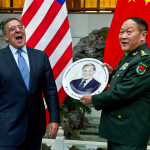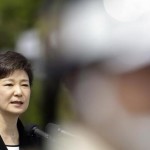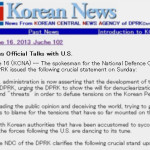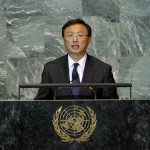- DETERRENCE: At war: notes from the front lines, globalization creates a new worry: enemy convergence
- DPRK: Situation on Korean Peninsula delicately balanced
- ENERGY SECURITY: Obama preparing big effort to curb climate change
- GOVERNANCE AND CIVIL SOCIETY: Summit transcript: Roh Moo-hyun’s idea was a peace zone, not abandonment
- CLIMATE CHANGE ADAPTATION: Least developed, most vulnerable: have climate finance promises been fulfilled for the LDCs?
- AUSTRAL PEACE AND SECURITY: The emerging Asia power web: the rise of bilateral intra-Asian security ties
Archives
US-China: Joined At The Hip

by Peter Hayes June 27, 2013 I. Introduction Peter Hayes writes “The tug of war over Taiwan and the contest between the US and Chinese military to deny access to the other in China’s coastal zone and the western Pacific States is……simply the most dangerous possible conflict in the region….Yet even here, we find that […]
Park Geun-Hye’s China Challenge

Is it possible for President Park to get China to commit to more than a symbolic statement regarding North Korea’s nuclear weapons program during her upcoming meeting with President Xi Jinping? According to Peter Hayes, “The answer is definitely yes. South Korea can propose at least three types of “three party talks” at the Summit that would put South Korea in the driver’s seat, and break the deadlock with North Korea. These are all consistent with the eventual resumption of the Six Party Talks, although they do not depend upon this happening to have positive effects.” He goes on to state that, “At this juncture, only President Park can provide the necessary leadership to move this agenda forward.”
Peter Hayes is the Executive Director of the Nautilus Institute and a Professor at RMIT University.
The South China Sea: Evolution of or Disregard for International Law?
Huy Duong and Tuan Pham analyze statements that Mark Valencia, in his article The South China Sea: What China Could Say, asserts that China could potentially issue in order to ‘clarify its position regarding its maritime claims and actions in the South China Sea.’ Huy Duong and Tuan Pham conclude that these statements show that China’s stance is at odds with the current regime of international law in a way that cannot be addressed by rhetoric or justified as evolution of international law. Mark Valencia offers a rejoinder to this response.
Huy Duong works at the Southeast Asian Sea Foundation and contributes articles to the BBC and Vietnam’s online publication VietNamNet. Tuan Pham is an Associate Professor at the University of New South Wales. The authors wish to thank David Brown and Dang Vu for valuable comments.
Mark J. Valencia is a Visiting Senior Scholar at the National Institute for South China Sea Studies, Haikou, China.
A Regional Framework for a Comprehensive Security Settlement in the Korean Peninsula

James Goodby writes that if the Administration’s “pivot to Asia” is meant to signal a new era of American activism in the Asia-Pacific region, the president should describe to his partners in Asia how he sees the elements of a comprehensive security settlement coming together. A beginning can be made by defining the categories of security issues that need to be addressed, and by which states. The three main categories are:
(1) issues left over from the 1950-53 Korean War and the elements of a North-South peace regime (most of which have solutions that have been formally agreed upon in past statements issued by the North and South Korean Governments and many have been at least implicitly endorsed this year by Kim Jong-un)
(2) issues related to North Korea’s nuclear weapons program (and President Obama’s call for “a world without nuclear weapons” could be a device for placing a de facto nuclear weapons-free zone on the agenda to address this), and
(3) issues related to regional inter-state relations in Northeast Asia (one approach to solving these would be to organize something like an Organization for Security and Cooperation in Europe (OSCE) for Northeast Asia).
James Goodby is a Nonresident Senior Fellow at the Center for Northeast Asia Policy Studies, The Brookings Institution. Ambassador Goodby’s analysis does not necessarily reflect the opinions of the institutions with which he is affiliated.
Nautilus Peace and Security Weekly – 20 June 2013
- DETERRENCE: Back to the drawing board: the need for sound science in U.S. missile defense
- DPRK: (China’s) Foreign Ministry to hold strategic talks with DPRK
- ENERGY SECURITY: Four energy policies can keep the 2 °C climate goal alive
- GOVERNANCE AND CIVIL SOCIETY: N. Korea alters definition of “denuclearization”
- CLIMATE CHANGE ADAPTATION: Planning, building and insuring: adaptation of built environment to climate change induced increased intensity of natural hazards
- CLIMATE CHANGE AND SECURITY: Climate Change and Conflict: Avoiding small talk about the weather
China and the United Nations Sanctions on North Korea

In this Policy Forum Zhang Guihong argues that United Nations Resolutions on North Korea, while necessary, wil…
网络空间安全威胁与对策思考

[Chinese Version] In this Special Report Senior Colonel (Retired) Fan Gaoyue argues that the …
Threats to Cyberspace and Responses

[English Version] In this Special Report Senior Colonel (Retired) Fan Gaoyue argues that the …
Nautilus Peace and Security Weekly – 13 June 2013
- DETERRENCE: U.S. sees China launch as test of anti-satellite muscle
- DPRK: Heads (of State) Xi Jinping and Obama hold their second meeting
- ENERGY SECURITY: US-China climate deal seen as first step
- GOVERNANCE AND CIVIL SOCIETY: Northeast Asia needs non-traditional teamwork
- CLIMATE CHANGE ADAPTATION: Heavy weather: climate and the Australian Defence Force
- AUSTRAL PEACE AND SECURITY: Japan’s emerging amphibious capability

